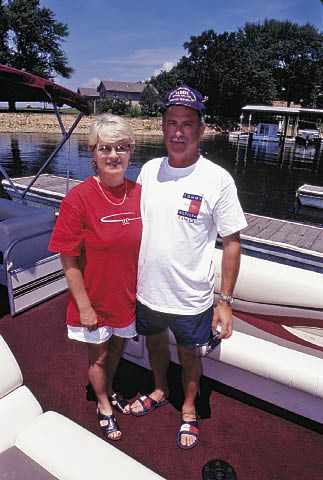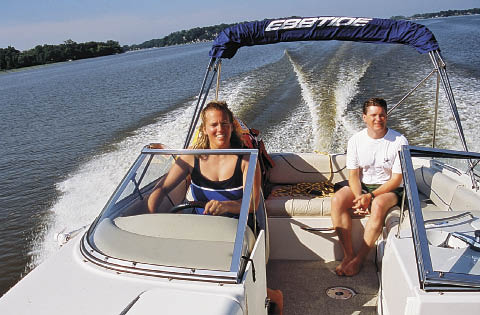 Statics prove sharing hobbies with your spouse is a key factor in having a successful marriage. The more you're able to do together as a couple, the happier you'll both generally be. But in marriage, as in life, there are always compromises. It can be as simple as surrendering the remote to American Idol in exchange for the NFL Sunday Ticket football package. Or something a little more permanent like going with the mini-van when you had your heart set on the SUV.
Statics prove sharing hobbies with your spouse is a key factor in having a successful marriage. The more you're able to do together as a couple, the happier you'll both generally be. But in marriage, as in life, there are always compromises. It can be as simple as surrendering the remote to American Idol in exchange for the NFL Sunday Ticket football package. Or something a little more permanent like going with the mini-van when you had your heart set on the SUV.
Not all hobbies can (or should) be shared, but boating is definitely one activity that can be best enjoyed with your spouse. But even though boating can be one of the most enjoyable and rewarding experiences of our life, there can be a right way and a wrong way to introduce your spouse into boating.
Generally speaking they say you'll go out 10 times before it happens-that perfect boating experience-and you'll keep going out nine times more to recapture that magic. If you'd like your spouse to enjoy the boating life as much as you, it's important to plan your  introduction correctly. The secret to creating a successful boating partnership is to use some of the following ideas to encourage your partner, and make the dream as much theirs as it is yours.
introduction correctly. The secret to creating a successful boating partnership is to use some of the following ideas to encourage your partner, and make the dream as much theirs as it is yours.
1. Start Slowly
Gaining trust and confidence can go a long way and it's important to show your spouse you have the knowledge and skills to correctly operate a boat. If you happen to be new to boating, make sure your first trips build that confidence. Choose calm weather days when your lake is less crowded and keep your itinerary simple.
Anyone with a little money can buy a pontoon or deck boat and learn the basics of how to maneuver it. But it takes time and varied experiences to become proficient so you react correctly and calmly in a variety of situations. If you take the time to learn and practice before attempting anything ambitious, you'll avoid confidence-sapping situations that could destroy your dream of boating with your partner.
2. Mistakes Welcomed
Most boating skills tend to deteriorate when you're being coached constantly, especially when it comes to wheel time. Often your spouse becomes too focused on what you might criticize next, instead of steering. We're only trying to keep our partner from making the same mistakes we made starting out, but sometimes that's the only way she is going to truly learn.
As a guy it's not an easy thing for us to accept and that's why having your wife take an all-female boating class to help gain  confidence and hone skills in a conducive and less-threatening atmosphere is often a great choice.
confidence and hone skills in a conducive and less-threatening atmosphere is often a great choice.
Plus, by allowing for mistakes without letting it ruin your day, you'll also make life afloat more pleasant for your partner. Boats are tough and often forgiving, especially a pontoon boat. Don't let a misjudged dock approach become a big deal. Remember boats are far easier to mend than broken relationships.
3. Positive Reinforcement
Face it: enthusiasm is contagious. Instead of focusing on lectures, books or movies that emphasize the negative aspects of boating, look to include as many positive-reinforcement opportunities as you can.
4. Off Peak
While you're still gaining your spouse's confidence, avoid entering your local launch ramp at peak hours. When you come into a marina, all eyes are on you and the slightest mistake can escalate your anxiety, especially if you're trying to load your boat during the busiest time of the day. Sometimes it's better just to anchor until the rush dies down or at least until the wind eases up a little to ensure a smoother experience.
Picking a less busy day of the week to practice docking with less spectator pressure is a great way to not only build confidence, but to also help develop your own communication plan. Knowing ahead of time what your spouse's role will be as you come into the  dock will help relieve some of that pressure. But above all, discuss and accept the pressures that observers create and don't let this chip at the confidence you're trying to build in your partner.
dock will help relieve some of that pressure. But above all, discuss and accept the pressures that observers create and don't let this chip at the confidence you're trying to build in your partner.
5. Discuss Yelling
Guys see yelling as just another form of communicating, especially when wind or other situations make it difficult to communicate effectively, while some women feel yelling is reserved for times of anger or fear. It's important to candidly discuss the difference because the memory of raised voices tends to linger in a woman's mind long after the incident has passed.
Here is one scenario that should be talked about: You're coming into the dock, the wind is picking up, the engine thumping and there is a good distance between you and your partner who is, by necessity, facing away from you. How can you make sure he or she hears you, without yelling? Practice helps, especially when it comes to developing hand signals. Try calling "very loudly" and then having the other person repeat the order so that each person knows the other heard and understood. Finally, be ready to accept that some instances of yelling are caused by your own tension/apprehension, real or imagined. Apologize sincerely once the situation is under control and explain that no anger was intended so you can work toward developing into a better boating team.
6. Outside The Box
Sometimes you need to get a little creative when you're trying to entice your partner into the boating life. Take a closer look at her hobbies and incorporate those interests into your time on the water. Does she love shopping and antique stores? Make time to come  ashore and visit some of those places that she'll enjoy visiting. And if she loves dining out, she'll love the experience of docking and going into restaurants by boat. In no time your partner will connect boating with her interests and view the pontoon or deck boat as a vehicle that opens her to new experiences that she loves.
ashore and visit some of those places that she'll enjoy visiting. And if she loves dining out, she'll love the experience of docking and going into restaurants by boat. In no time your partner will connect boating with her interests and view the pontoon or deck boat as a vehicle that opens her to new experiences that she loves.
7. Back Up Planning
One concern for many spouses is the fear of operating the boat herself, if something should happen to the captain. Some boating schools now offer courses on how to bring your boat back into port alone, anchor, then contact assistance should a partner be out of commission. Women do worry about this scenario. Address it together and you'll have removed one more obstacle to boating.
8. Honesty
Despite what photos and advertisements might lead you to believe, boating isn't always easy, and isn't always romantic. If you lead your spouse into thinking otherwise, you're leading yourself astray, too. Let's be honest. Boating is physical. You must carry  everything you use from the shore to the boat. You have to store things so they don't get loose and blow out while underway. This means you might have to get up and move to get something else, which can be a hassle. When you actually set off on a cruise, learn to give each other physical and mental space. Be realistic, and talk about it more as an intimate adventure that will connect you to nature.
everything you use from the shore to the boat. You have to store things so they don't get loose and blow out while underway. This means you might have to get up and move to get something else, which can be a hassle. When you actually set off on a cruise, learn to give each other physical and mental space. Be realistic, and talk about it more as an intimate adventure that will connect you to nature.
Recap
Following the suggestions in this article is a good step in the right direction to getting your spouse to love boating like you do, but don't be afraid to make your own adjustments and personalize these tips to your own needs.
Above all else it's important to establish a sense of interdependence, create your boating goals together, trust each other when the going gets rough and of course establish good communication methods. Communication is the key to good boating partnerships. Combine learning how to communicate afloat with some confidence-building boating experiences, and you'll increase your partner's enjoyment and sense of self-sufficiency.

